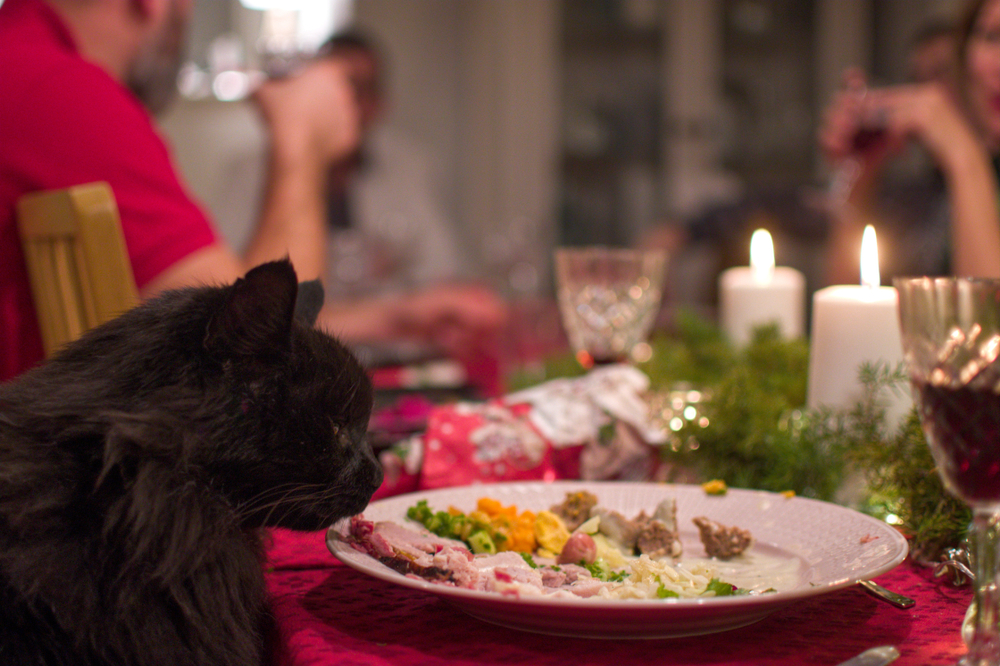As the holiday season approaches, we know you want to spoil your pet to show how much you love them, but some holiday foods are toxic to pets. While we don’t recommend that you toss your furry pal a turkey leg or some Christmas ham, parts of your holiday meal can be safe for your pet. Here are six ways to safely spoil your four-legged friend that won’t require a trip to the nearest emergency veterinary hospital.
#1: Lean meats
Main meat dishes top your pet’s list of tasty treat choices, but the way meat is served is typically hazardous for your furry pal. Glazed ham is high in sodium and sugar, while deep-fried turkey contains too much fat in the skin and dark meat to be a healthy choice. Additionally, spices and seasonings may contain toxic ingredients, like garlic and onions, that can result in red blood cell damage.
When sharing meaty treats with your pet, follow these preparation tips for a healthy snack:
- Remove skin and bones
- Avoid seasonings, spices, and glazes
- Cook thoroughly
- Offer small pieces, in moderation
Also, keep in mind that you should feed your pet only lean meats. Avoid fatty cuts of steak, sodium-filled deli meats, and dark turkey and chicken meat. Fish (e.g., tilapia, tuna, salmon), turkey or chicken breast, and game meats (e.g., venison, bison) make much healthier alternatives.
#2: Vegetables
If your pet imitates your kids and turns up their nose at fresh veggies, don’t turn to butter, salt, cheese, and other ingredients to hide the taste. Instead, prepare vegetables in different, yet healthy, ways to make nutrient-packed snacks. Avoid hiding green beans and sweet potatoes in casseroles, and steam or roast them instead. Roasting vegetables creates a crispy, caramelized “skin” that your four-legged friend likely cannot resist, and is much healthier and safer than topping veggies with butter, brown sugar, and marshmallows.
#3: Fresh fruits
Gooey apple pie and decadent fruitcakes are healthy, because they contain fruit, right? Not so fast. Fruit is at its healthiest in its purest form, so being nice and fresh is best for your pet. Also, avoid toxic fruits, which include grapes, raisins, currants, and avocados, and remove all pits, seeds, and skins before serving.
Healthy fruit choices for pets include:
- Apples
- Berries
- Bananas
- Melons
Keep in mind that fruit is high in natural sugar and feed only small portions. Serve fresh fruits in bite-size pieces to prevent choking, or lightly steam them to soften the fruit.
#4: Pumpkin puree
Staying away from the dessert table is tough, whether you have two legs or four, but you can make healthy choices for your pet when sharing sweet treats. Keep pets away from chocolate, nuts, xylitol, and the many spices used to liven up desserts and stick to plain canned pumpkin—not pie filling—or xylitol-free peanut butter for a sweet snack.
#5: Treat puzzles
You’re already busy enough whipping up a mouthwatering feast for family and friends, so serve your pet their usual safe treats instead of spending time modifying “people food” recipes. But, serve the treats differently. Tempt your pet with their favorite snacks hidden in a treat puzzle, or a concoction of peanut butter, spray cheese, canned food, tuna, or low-fat cottage cheese stuffed in a rubber Kong.
#6: Dental chews and treats

A meaty turkey drumstick or the ham bone may seem like a great way to keep your pet occupied while you play games and open gifts, but bones—raw or cooked—are incredibly dangerous for pets. Raw bones can be a source of food-borne bacteria, like E. coli or salmonella, and can also fracture your pet’s teeth. Cooked bones are brittle and can splinter into sharp shards when chewed, piercing your pet’s mouth or becoming lodged in their gastrointestinal (GI) tract.
Don’t toss your pet a bone—instead, toss the bone in the trash and offer your pet a dental chew or treat that bears the Veterinary Oral Health Council’s seal of acceptance. These accepted products have demonstrated that they successfully slow plaque and tartar accumulation on your pet’s teeth, making them the ideal year-round treat rather than saving them solely for holidays.
Opportunistic pets can sniff out the treats in children’s stockings or beg for snacks under the table and end up with GI issues or toxicity. If your furry pal gets their paws on an unhealthy holiday treat, give our Southern Kern Veterinary Clinic team a call for help.







Leave A Comment